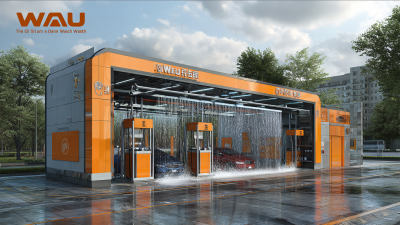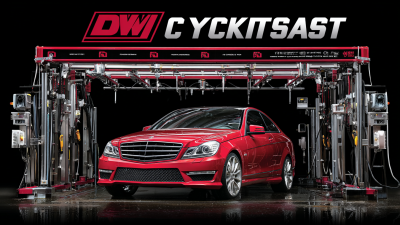Unlocking Time and Cost Savings with Automatic Semi Truck Wash Solutions
 In an era where efficiency and cost-effectiveness are paramount in the transportation industry, the adoption of Automatic Semi Truck Wash solutions has become a game-changer for fleet operators. According to a report by IBISWorld, the truck wash services market is projected to grow by 4.2% annually, fueled by the increasing demand for cleanliness and maintenance in trucking operations.
In an era where efficiency and cost-effectiveness are paramount in the transportation industry, the adoption of Automatic Semi Truck Wash solutions has become a game-changer for fleet operators. According to a report by IBISWorld, the truck wash services market is projected to grow by 4.2% annually, fueled by the increasing demand for cleanliness and maintenance in trucking operations.
Automatic Semi Truck Wash systems not only deliver consistent results but also significantly reduce labor costs and turnaround times, which can be critical during peak operational periods. Furthermore, a study from the American Trucking Association highlights that a well-maintained fleet can enhance fuel efficiency by up to 10%, underscoring the vital role of regular washing.
As fleet managers seek innovative strategies to optimize their operations, understanding the potential of Automatic Semi Truck Wash solutions is crucial for unlocking substantial time and cost savings.
Benefits of Automatic Semi Truck Wash Solutions for Fleet Management
The rise of automatic semi truck wash solutions is transforming fleet management by offering significant time and cost savings. With the global fleet management market projected to reach over $34 billion by 2025, adopting automated washing systems can be crucial for fleet operators. These systems not only ensure that vehicles maintain a professional appearance, but they also extend the lifespan of the fleet through regular maintenance, thereby reducing overall operational costs.
Recent advancements in technology, including IoT applications in the automotive industry, enhance efficiency by enabling predictive maintenance and intelligent operational management. For instance, automated wash systems can be integrated with fleet management software to schedule washes based on vehicle usage patterns and environmental conditions. This proactive approach minimizes downtime and enhances the viability of the fleet, particularly for businesses involved in transportation and logistics.
Companies that leverage these innovations are better positioned to optimize their fleet operations while ensuring compliance with safety and cleanliness standards.
Cost Comparison: Traditional vs. Automatic Truck Washing Methods
When it comes to maintaining a fleet of semi trucks, the method of washing can significantly impact both time and costs. Traditional truck washing methods often involve labor-intensive procedures that require multiple employees and extended downtime. Typically, these methods use high-pressure hoses, detergents, and manual scrubbing, which can lead to inconsistencies in cleaning quality and a higher risk of equipment damage. The result is a longer turnaround time, which translates to reduced productivity and increased operational costs.
In contrast, automatic truck wash solutions offer a streamlined and efficient alternative. By utilizing advanced technology, these systems can wash a truck in just a few minutes, drastically reducing the time it takes to get vehicles back on the road. Furthermore, the cost comparison between the two methods reveals that automatic washes can save businesses significant amounts in labor costs and water usage. With the precision and consistency of automatic systems, fleets can maintain a pristine appearance while maximizing their return on investment. The choice between traditional and automatic truck washing methods is clear, especially for those looking to enhance their operational efficiency and cut down on expenses.
Reducing Downtime: How Automatic Washes Enhance Operational Efficiency
 Automatic wash solutions for semi trucks are revolutionizing fleet management by significantly reducing downtime and enhancing operational efficiency. Traditional washing methods often require substantial time, leading to lost productivity and higher operational costs. In contrast, automatic washes streamline the cleaning process, allowing trucks to get back on the road quickly, which is crucial for logistics and transport businesses looking to maximize their uptime.
Automatic wash solutions for semi trucks are revolutionizing fleet management by significantly reducing downtime and enhancing operational efficiency. Traditional washing methods often require substantial time, leading to lost productivity and higher operational costs. In contrast, automatic washes streamline the cleaning process, allowing trucks to get back on the road quickly, which is crucial for logistics and transport businesses looking to maximize their uptime.
Moreover, the integration of advanced technologies, such as drones for exterior cleaning, is pushing the boundaries of what's possible. These innovations not only deliver faster results but also prioritize safety, effectively minimizing the risks associated with manual washing. The focus on enhancing operational efficiency through automatic washes aligns with broader trends in facility management and technological advancements that prioritize both cost savings and sustainability. As businesses continue to seek intelligent solutions to optimize their operations, automatic wash solutions emerge as essential assets for maintaining fleet cleanliness and reliability.
Case Studies: Successful Implementations of Automatic Truck Wash Systems
Automatic truck wash systems have revolutionized the way fleet operators manage their washing needs, leading to substantial time and cost savings. Case studies from various transportation companies highlight the operational efficiencies achieved through these systems. For instance, a logistics company in Texas reported a 50% reduction in wash times, allowing trucks to become road-ready much quicker. This efficiency not only minimizes downtime but also maximizes the return on investment by keeping trucks on the road longer.
Implementing automatic wash solutions comes with notable benefits, but it is essential to consider a few tips for successful utilization. First, choose a system that meets the specific size and volume demands of your fleet. A customized approach can prevent bottlenecks and ensure every vehicle is cleaned effectively. Second, integrate the wash schedule with your regular maintenance checks to streamline operations — aligning both processes can lead to even greater time savings.
Moreover, regular training for staff operating the automatic wash systems is critical. Equip them with the knowledge to troubleshoot minor issues and perform routine maintenance. An informed team can enhance the performance of the truck wash, ensuring longevity and reducing long-term operational costs.
Time and Cost Savings with Automatic Semi Truck Wash Solutions
This chart illustrates the time and cost savings observed in different automatic truck wash systems over a period of 12 months. The data highlights the average time taken for a wash, the average cost per wash, and shows the efficiency improvements achieved through automation.
Future Trends in Truck Washing Technology and Sustainability Practices
The future of truck washing technology is being shaped significantly by advancements in automation and sustainability practices. As the demand for efficient vehicle maintenance grows, operators are increasingly turning to automatic semi truck wash solutions that not only save time but also reduce water and energy consumption. These systems leverage smart technology, such as sensors and IoT connectivity, to create a more efficient washing process, ensuring that fleets maintain a clean and professional appearance while minimizing their environmental footprint.
Sustainability practices are becoming integral to the design and operation of truck washing facilities. Innovations such="water recycling systems" and biodegradable cleaning agents are on the rise, addressing the environmental concerns associated with traditional washing methods. By prioritizing these eco-friendly approaches, companies can enhance their corporate social responsibility initiatives while benefiting from cost savings. Future trends indicate a shift towards more integrated systems that not only clean trucks effectively but also track and analyze water usage and efficiency, paving the way for a more sustainable logistics industry.

Related Posts
-

Mastering the Art of Efficient Truck Maintenance: A Complete Guide to the Best Automatic Semi Truck Wash Solutions
-

Ultimate Guide to Selecting the Best Touchless Car Wash Machine for Your Business
-

Unmatched Quality: China’s Top Drive Through Car Wash Machines for Global Buyers
-

How to Choose the Best Industrial Car Wash Machine for Your Business Needs
-

Ultimate Checklist for Evaluating the Cost of the Best Automatic Car Wash Systems
-

Unlocking Success with Best Touchless Car Wash Machine 7 Key Industries Transforming Vehicle Cleaning